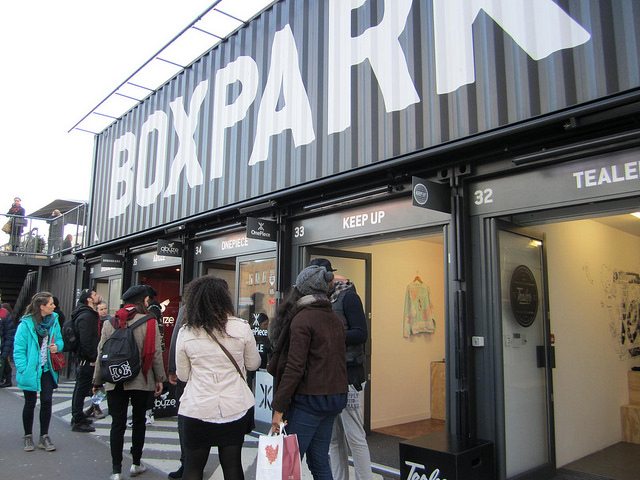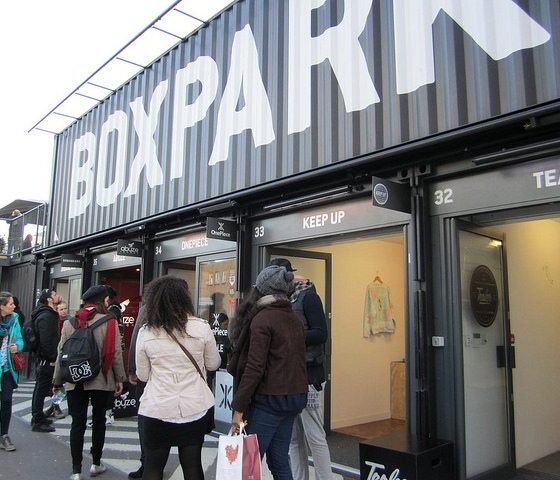

Economy
Is the pop up boom good for business and the environment?
Everywhere you look now there are businesses ‘popping up.’ Literally seeming to come from nowhere, and disappearing equally quickly, what started as a quirky idea in some of the major cities has now spread all around.
Constructing a new building is costly – in terms of time, finance, and its impact upon the environment. Commandeering an existing space is not only a cheaper way of doing business, but reduces the waste involved in fitting it, and as many outfits share spaces allows for a reduction in resources.
Who would have thought that some of the derelict and seemingly worthless warehouses in south east London could become hot spots for the hip and trendy, that long gone village stores could be resurrected, or even that a cleared space filled with steel huts would be a hub for big brands, like BoxPark in Shoreditch.
Although prices in some areas are rising (see Shoreditch), the use of apparently derelict space to house a business can be an affordable way for start ups to trial their venture, and get on the enterprise ladder. An entry point into city space and commercial practices where finances may otherwise be a barrier allows entrepreneurs to try new ideas and take risks. Sustainable financial investment can often only come once a business has proven itself, but the opportunity to prove itself needs to be there, and ‘pop up’ allows for this.
We’ve seen that the established way of business and finance is not necessarily the best, but it is still difficult to trial something new, and anything which allows for such an opportunity without long term risk to either the individual or the environment in which they operate will facilitate consideration and commitment to change. A long term impact on the local economy and employment can only come after this.
Reinvigorating what was once waste space and utilising underused assets is not only a sensible use of brown space, but bringing business to a flagging area helps revive local communities with both financial assistance and a sense of purpose.
One of the most inspiring things about these trends is not when big businesses notice that it’s a trend, but when local people take it upon themselves to take action to invigorate their locality.
The founders of a shop in a closed primary school in Kingsdon in Somerset have had an “electrifying” effect on the village, with a trickle on impact to the area. The playground has reopened, and community groups have started as a result of people meeting one another in the shop, and “a sense of belonging and community” has developed.
The recently opened Sherriff Centre in West Hampstead is an attempt to once again make the church in which it is housed, as a building rather than religious institution, the centre of the community. Inside is a Post Office, café, children’s crèche, and events space for local groups and support teams. Again, low rates and the use of underused space have had benefits for individuals, the business operators, and the civic space as a whole.
Up in Salford, a number of retailers and creators recently got together for the Salford 4 Good Pop Up, a twelve week project that raised over £11,000 for a dozen local charities. And there’s also 3Space, a charity that works with landlords and leaseholders to offer organisations and charities free rent of an otherwise empty space.
A creative, entrepreneurial and community minded ethos that is good for the environment – popping up near you soon.
Francesca Baker is curious about life and enjoys writing about it. A freelance journalist, event organiser, and minor marketing whizz, she has plenty of ideas, and likes to share them. She writes about music, literature, life, travel, art, London, and other general musings, and organises events that contain at least one of the above. You can find out more at www.andsoshethinks.co.uk.
Photo: La Citta Vita via Flickr
Take our 2014 reader survey and you could win an iPad, Kindle or donation to a charity of your choice.
Further reading:
5×15′s Capitalism and its Discontents, London – review
Smart cities don’t add complication, they allow society to thrive
Are cities where sustainable futures will be made?
London’s ecosystem is as complex as anywhere. Should it be a national park?
Shows like the Big Allotment Challenge can be more than just good TV


 Environment12 months ago
Environment12 months agoAre Polymer Banknotes: an Eco-Friendly Trend or a Groundswell?

 Features11 months ago
Features11 months agoEco-Friendly Cryptocurrencies: Sustainable Investment Choices

 Features12 months ago
Features12 months agoEco-Friendly Crypto Traders Must Find the Right Exchange

 Energy11 months ago
Energy11 months agoThe Growing Role of Solar Panels in Ireland’s Energy Future






























